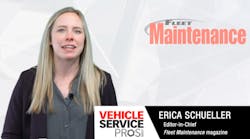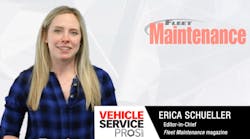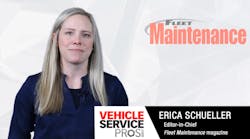The idea of improving aerodynamics and fuel efficiency is not new to heavy duty trucking. For years, companies have looked to lightweighting, aerodynamics and reduced emissions to help make trucks more efficient and adhere to government regulations.
Shell Lubricants has partnered with Airflow Truck Companies to bring a number of the latest technologies used for these processes together, to create the Starship Initiative hyper-fuel efficient Class 8 truck. We talked with Shell Lubricants' Megan Pino and Dan Arcy about the plans behind this partnership, and the goals the companies look to achieve with this concept truck.
Transcription of interview:
Erica Schueller, Fleet Maintenance: Hi! Welcome to VSP News: Uptime Update. I am your host Erica Schueller, Editor-in-Chief of Fleet Maintenance magazine, covering all maintenance, all vehicle classes, all management, all the time.
The concept of improving aerodynamics and fuel efficiency is not new to heavy duty trucking. For years, companies have looked to lightweighting, aerodynamics and reduced emissions to help make trucks more efficient and adhere to government regulations.
Shell Lubricants has partnered with Airflow Truck Companies to bring a number of the latest technologies used for these processes together, to create the Starship Initiative. Dubbed the “hyper-fuel efficient Class 8 truck,” Shell has been showcasing this concept tractor-trailer at a number of different industry events, with plans to test it in a real-world setting.
We talked with Megan Pino, Shell Rotella global brand manager, and Dan Arcy, global OEM technical manager for Shell Lubricants, to learn more about the motivations behind the Starship Initiative, and Shell Lubricants’ involvement with the process.
First, Pino share more insights of how and why this project got started.
Megan Pino, Shell Rotella: The world faces many challenges and changes. We at Shell like to call those the three hard truths: rising global populations, increase in urbanization and strong economic development. All of those will lead to strong increases in energy demand. Globally, we see the potential for increases of up to 25 percent by the year 2035.
Meeting these increases in energy demand, as well as looking to minimize CO2 emissions is certainly a key concern.
But, we believe at Shell, there is no single solution to accomplishing these challenges that we have.
We’ve partnered with Airflow Truck Companies to build this hyper-fuel efficient Class 8 truck. We believe that this is one way to demonstrate what’s possible in minimizing CO2 emissions and improving freight ton efficiency.
There are certainly others in the transportation industry that are looking to develop similar future technologies to improve CO2 emissions.
We think this is a great demonstration of what is materially possible today, using the technologies available.
Schueller, Fleet Maintenance: The Starship Initiative is designed to explore the future of what’s possible in truck design, fuel economy savings and CO2 reduction. There were key areas the designers focused on to make this possible.
Dan Arcy shares more.
Dan Arcy, Shell Lubricants: The changes can be summarized in three key areas: Aerodynamics, efficiencies and Shell technologies.
From an aerodynamics standpoint, we’ve developed a full carbon fiber, lightweight bespoke cab design.
On the efficiency side, we’ve gone with a 6x2 axle configuration and an automatic tire inflation system.
For Shell technologies, we’re using Shell Rotella T6 Ultra 5W-30 full synthetic engine oil which is a fuel-efficient FA-4 diesel engine oil. Along with that, Spirax low-viscosity axle and transmission fluids.
Schueller, Fleet Maintenance: Not only has this truck been built and on display at recent industry events, Shell and Airflow plan to test this in a real-world setting.
Pino talks about the development process, and what’s next for the Starship Initiative.
Pino, Shell Rotella: We’ve done this in order to demonstrate what’s possible in maximizing freight ton efficiency and lowering CO2 emissions.
We’ve combined technologies that are available today on the market, as well as some custom technologies, working together to build this demonstration vehicle.
We’ll be taking it across the country, carrying a real load of freight in order to demonstrate what’s possible in maximizing that freight ton efficiency.
Schueller, Fleet Maintenance: If you’d like more information on the Starship Initiative, including details on the specs of the truck and the results of the coast-to-coast freight ton efficiency calculations, check out the link below.
Thank you for tuning in to VSP News Uptime Update, I’m your host Erica Schueller.
Until our next broadcast, keep up with this, and other industry topics, by visiting us online at VehicleServicePros.com.
Find out more about the Starship Initiative.


